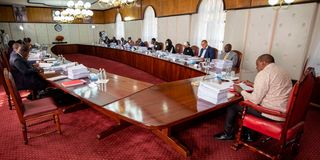Govt spent Sh37bn more on travel, hospitality during Uhuru's last months in office

Former President Uhuru Kenyatta (right) chairs a Cabinet meeting at State House, Nairobi. Data from the National Treasury shows that within the last three months of Kenyatta’s reign to September, civil servants gobbled up Sh193.2 billion in expenditure on operations and maintenance votes.
Spending on non-essentials such as travel, hospitality, and training by the government rose by over Sh37 billion as the country was busy with campaigns, elections and the transition to the new regime.
Data from the National Treasury shows that within the last three months of former President Uhuru Kenyatta’s reign to September, civil servants gobbled up Sh193.2 billion in expenditure on operations and maintenance votes, which include domestic and foreign travel, hospitality, training, renting spaces for non-residential use and maintenance of vehicles.
Spending on the items grew from Sh155.6 billion during a similar period – July to September – last year, underlining the burden added onto taxpayers’ shoulders as the country faced tough economic times marked by a high cost of living.
The Treasury report showed that apart from growing by 24.2 per cent, the Sh193.2 billion spending also breached a target to spend Sh167.7 billion on the votes during the three months. This means civil servants overshot their target- by 15.2 per cent.
Spending on recurrent activities, which also include salaries and pension, grew by Sh52.7 billion within the three months, even as the government’s spending on development dropped from Sh117 billion in the quarter to September 2021, to Sh98.4 billion.
Development expenditure
The government had, however, targeted to spend a lower amount on development.
“Development expenditure was above target by Sh19.3 billion to amount to Sh98.4 billion by end September 2022,” Treasury stated in a presentation during the launch of the process to make the 2023/24 budget.
Spending on salaries and wages rose by Sh7.8 billion during the quarter compared to last year, which had been projected in budget targets.
The government spent a total of Sh675 billion during the three months, up from Sh631.7 billion during a similar period in 2021.
“Total expenditure to September 2022 amounted to Sh675.1 billion against a target of Sh694 billion and translating to a shortfall in the expenditure of Sh18.9 billion,” Treasury stated.
Historically, civil servants have always spent heavily on domestic and foreign travel as captured by Controller of Budget reports, followed by spending on hospitality, training, and rentals and rates on non-residential.
In the year to June 2022, for instance, spending on domestic travel in the national government was Sh14.1 billion, Sh6 billion on foreign travel, Sh9.8 billion on rentals, and Sh6.26 billion on hospitality.
Spending on recurrent budgets has also been growing during transitions after previous elections, with audit reports having raised serious queries on how the funds were used, suggesting an organised way to pilfer funds from the government around election time.
The Sh37 billion jump in non-essential spending coincided with a period when Kenya failed to meet Sh84.6billion debt repayment obligations to its external creditors in the year to June 2022 due to a biting cash crunch and instead carried over the payments to the current financial year.
The International Monetary Fund (IMF), in its latest review of the government’s progress on implementing projects under its 38-month credit programme, disclosed that Kenya failed to pay 0.7 per cent of the country’s GDP to external creditors due to a lack of money. The lender did not name the affected creditors.
Kenya’s GDP was valued at Sh12.0982 trillion by 2021, according to the Central Bank of Kenya.
The IMF observed that while Kenya grew its tax revenues and cut budget deficits during the year – President Kenyatta’s last financial year in office – the country’s debt pressures remained elevated.
The lender also observed that a mix of factors, including huge amounts spent on subsidising fuel, high inflation and disruptions in global supply chains causing a spike in import prices, impeded Kenya’s efforts on growing revenues and cutting the budget deficit.





